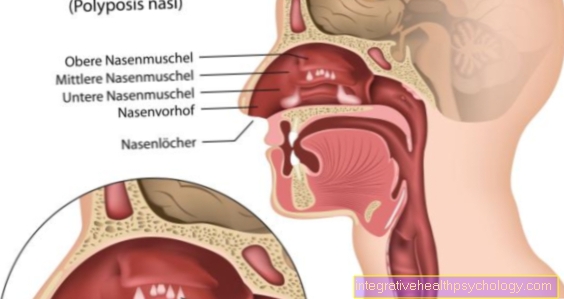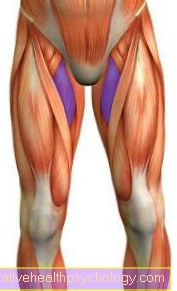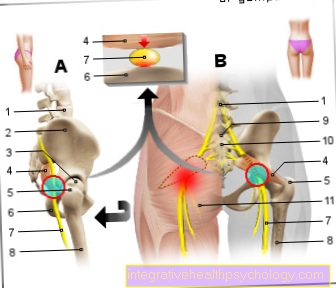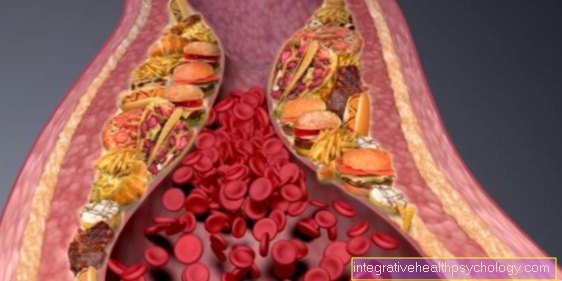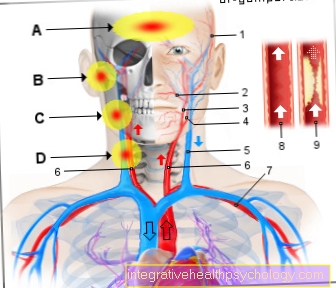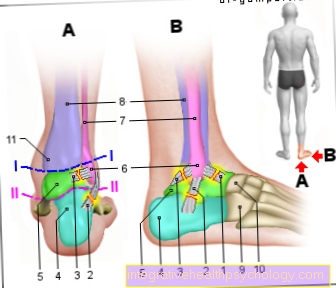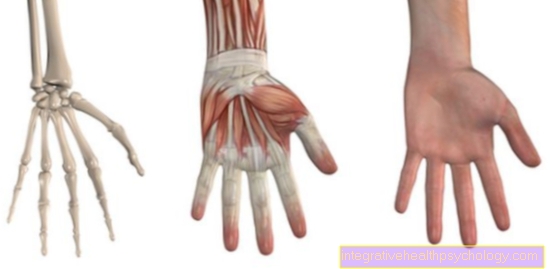Heart pills
What are heart tablets?
Heart tablets are generally understood to mean either drugs that have an effect on the heart or drugs that can be prescribed for heart disease.
Roughly classified, heart tablets can have the following effects:
- You can prevent irregular heartbeat (antiarrhythmics),
- reduce the work the heart has to do (blood pressure medication, beta blockers, drainage medication, vasodilator medication such as nitrospray)
- improve blood flow to the heart (nitrospray, calcium channel blockers such as nifedipine)
- or increase the beating power of the heart (digitalis, catecholamines).
Read more on the subject below: Medicines for cardiac arrhythmias

Indications for heart tablets
Heart tablets are used for the following diseases.
Coronary artery disease, which is caused by calcification of the heart vessels, leads to reduced performance, chest pain when exerted (angina pectoris) and heart attack.
Heart failure is treated with drugs that decrease the work of the heart and relieve the symptoms of heart failure. In the case of cardiac arrhythmias, drugs are mainly used to prevent life-threatening heart rhythms.
Other drugs used for heart disease work against the risk factors high blood pressure and high cholesterol. This includes e.g. ACE inhibitors and statins.
Read more on the subject below: Drugs for cardiac arrhythmias
Medication for heart failure
The problem with heart failure is that the heart cannot pump enough to get the blood from the venous system to the main artery.
The main consequence is that the blood backs up in the veins, causing fluid to escape into the tissue.
This is particularly noticeable through fluid retention in the legs, but also in the lungs and liver. Storage in the liver leads to functional impairment, while storage in the lungs leads to poorer oxygen uptake and thus to shortness of breath.
In addition, the performance of patients with cardiac insufficiency is limited, and even bedridden.
An important drug for heart failure are water tablets (e.g. Lasix®) so that the water can be excreted. In addition, digitalis is still used today, which increases the strength of the heart, but is very dangerous in the event of an overdose.
Beta blockers, which reduce the effects of adrenaline on the heart, are particularly effective in stopping the heart from progressing. Although this initially leads to a further decrease in performance, as adrenaline increases the strength of the heart, it prevents over-stimulation of the heart, which in the long term further deteriorates the function of the organ. Blood pressure medication is also important, as high blood pressure puts a lot of strain on the heart.
Read more on the subject below: Beta blockers
Medication for cardiac arrhythmias
Various medications (antiarrhythmics) can be given for cardiac arrhythmias. With atrial fibrillation, the atria can no longer move in a coordinated manner, so that cardiac output decreases and the risk of strokes increases.
Medications that can correct atrial fibrillation are digitalis and beta blockers.
If atrial fibrillation persists, patients should take blood thinners (e.g. aspirin, Marcumar®) to reduce the risk of strokes.
Other cardiac arrhythmias affect the ventricle and are therefore much more dangerous, as humans die within a short time without coordinated beating of the ventricles. Especially after a heart attack, the electrical excitation of the heart is often disturbed, which can lead to dangerous rapid cardiac arrhythmias.
There are a number of antiarrhythmic drugs that can be used here. The most powerful of these drugs, amiodarone, has a number of serious side effects. Therefore, the use of implantable defibrillators, which recognize a dangerous heart rhythm and bring the heart back to normal with a current signal, is becoming more and more widespread.
Cardiac arrhythmias with a rhythm that is too slow are usually treated with a pacemaker.
Read more on the topic: Digitalis
How do heart tablets work?
Most heart tablets work either on the heart itself, on the blood vessels or on the kidneys.
- Beta blockers work by blocking receptors for adrenaline, a hormone that is released in stressful situations and increases the heart rate and the strength of the heart. In addition, an excess of adrenaline causes restructuring processes in the heart, which in the long term limit the strength of the heart. Beta blockers therefore lower the heart rate and strength so that the heart has to work less.
- Calcium channel blockers block electrical channels for calcium. This increases the diameter of the vessels and reduces the excitation and beating force of the heart. Therefore, they mainly lower blood pressure and lower the heart rate.
- Drainage tablets prevent the resorption of salt and water from the urine in the kidneys and thus cause fluid to be flushed out. They reduce the volume in the tissue and in the blood system and thereby lower the blood pressure and the work of the heart.
- Antiarrhythmics block electrical channels in the heart that carry electricity through the heart. This slows down the heart's excitation so that cardiac arrhythmias that are based on over-excited excitement can be prevented.
Side effects and interactions
Heart medications have numerous side effects.
Since most heart medications lower the strength of the heart and blood pressure, there is a risk of circulatory problems, which can manifest themselves in the form of dizziness, fatigue, but also dangerous drops in blood pressure and loss of consciousness.
This is especially true for nitro spray. Nitrospray must also under no circumstances be taken together with Sildenafil (Viagra), as the effect is intensified and leads to a sharp drop in blood pressure.
Antiarrhythmics can cause slow heart arrhythmias. Amiodarone can also lead to thyroid disorders, pulmonary fibrosis, deposits in the skin and cornea with visual disturbances as well as agitation, tingling and headaches.
Water medication can lead to dehydration and derailments in the salt balance, which in turn can trigger cardiac arrhythmias.
Beta blockers have a number of side effects such as bronchial constriction, headache, circulatory disorders, feeling cold in the arms and legs, and gastrointestinal disorders. In addition, beta blockers increase the effect of insulin and can lead to dangerous hypoglycaemia that is only noticed late.
Furthermore, the simultaneous use of calcium channel blockers can lead to cardiac arrhythmias.
When should heart tablets not be given?
Beta blockers should not be given if:
- Pregnancy,
- Asthma,
- Diabetes,
- Circulatory shock and acutely worsened heart failure.
Most antiarrhythmic drugs should not be given to patients with a slow heart rhythm disturbance.
Water medication should not be given in case of low blood pressure, salt balance disorders, urinary tract obstruction and severe liver dysfunction.
Dosage and intake
The many different heart tablets can be prescribed in a variety of dosages and therapy regimens.
With blood thinners such as Marcumar, the dosage must be selected so that a certain target range for blood thinning (Quick value or INR) is achieved.
Depending on the underlying disease, this target range can be different, so that a different dose is necessary.
Beta blockers must first be given in low doses and are increased over the course of therapy so that the body can get used to the drug.
Drainage tablets are preferably taken in the morning and not in the evening to avoid going to the toilet at night.
As with other medications, if you forget to take the next tablet, take it normally and never double it, as many heart medications can have life-threatening side effects if overdosed.
price
Since heart tablets require a prescription and the costs are covered by the health insurance company if indicated, the question of price does not arise from the point of view of most patients.
The price of heart tablets ranges from simple, well-known drugs such as acetylsalicylic acid (e.g. aspirin or generics), which cost a few euros per month, to new antibody drugs such as alirocumab (Praluent), an antibody for lowering cholesterol with annual therapy costs of a few thousand euros (as of 2017).
Heart tablets and alcohol - are they compatible?
When taking heart tablets, it is generally not necessary to renounce alcohol.
Since heart tablets often have to be taken permanently and some studies have found positive effects of alcohol in relation to heart disease, there is no reason to refrain from alcohol.
Alcohol and heart pills usually do not lead to any impairment of effectiveness or undesirable side effects. In individual cases, however, the prescribing doctor or a pharmacist should be asked about possible interactions with alcohol.




